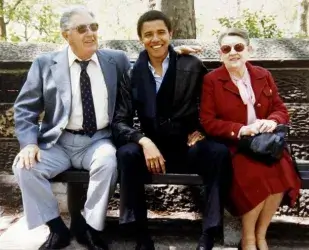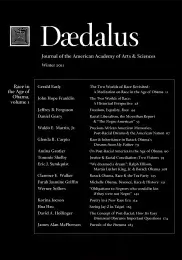
The Two Worlds of Race Revisited: A Meditation on Race in the Age of Obama
Nearly fifty years ago, the American Academy organized a conference and two issues of its journal Daedalus on the topic of “The Negro American.” The project engaged top intellectuals and policy-makers around the conflicts and limitations of mid-1960s liberalism in dealing with race. Specifically they grappled with the persistent question of how to integrate a forced-worker population that had been needed but that was socially undesirable once its original purpose no longer existed. Today racism has been discredited as an idea and legally sanctioned segregation belongs to the past, yet the question the conference participants explored - in essence, how to make the unwanted wanted - still remains.
The Two Worlds of Race: A Historical Perspective
Franklin’s essay traces the practices, policies, and laws that, from colonial times through the mid-1960s moment when he composed his essay, created and sustained the two worlds of race in America. He outlines the history of efforts from that period to alleviate racial distinctions and to foster a “world of equality and complete human fellowship.”
Freedom, Equality, Race
This essay explores some of the reasons for the continuing power of racial categorization in our era, and thus offers some friendly amendments to the more optimistic renderings of the term post-racial. Focusing mainly on the relationship between black and white Americans, it argues that the widespread embrace of universal values of freedom and equality, which most regard as antidotes to racial exclusion, actually reinforce it.
Racial Liberalism, the Moynihan Report & the Dædalus Project on “The Negro American”
In 1965, Daniel Patrick Moynihan, then an official in the Johnson administration, published The Negro Family: The Case for National Action, better known as the Moynihan Report. He was influenced by his participation in two conferences organized by the American Academy of Arts & Sciences in the mid-1960s, as well as two issues of its journal Dædalus, on the topic of “The Negro American.”
Precious African American Memories, Post-Racial Dreams & the American Nation
This interdisciplinary essay explores a fundamental paradox at the heart of American race relations since the 1960s: “the changing same.” The more things change; the more they remain the same. Combining historical and social-scientific evidence with autobiographical reflections, this discussion critically probes the paradoxical decline and persistence of two dimensions of our enduring racial quagmire: racial inequality and white supremacy.
Race & Inheritance in Barack Obama’s Dreams from My Father
When and how did Barack Obama's now well-known “hope” mantra take shape? Carpio's essay explores this question through close readings of key passages from Obama's autobiography. It is nearly three hundred pages into the autobiography before the phrase “the audacity of hope” appears, at the end of the “Chicago” section.
On Post-Racial America in the Age of Obama
Amina Gautier reflects on her childhood tendency to ask when, not if, there would be a black president. Growing up in the post-civil rights era, she was influenced by knowledge of earlier presidential bids by African Americans as well as references to the idea of a black president in popular culture, including television programs of the 1970s and 1980s that often saw adult characters project the ability to run for office onto black youth.
Justice & Racial Conciliation: Two Visions
As we attempt to measure racial progress in America today and chart a path toward further progress, we should look to the vision of Martin Luther King, Jr. Barack Obama has also offered an influential vision of race in America that is similar to and inspired by King's. This essay compares King's and Obama's respective visions for race relations in U.S. society.
“We dreamed a dream”: Ralph Ellison, Martin Luther King, Jr. & Barack Obama
In Spring 2010, a manuscript version of Ralph Ellison's unfinished second novel, Three Days before the Shooting, was finally published. Written over the course of more than forty years and running to 1,100 pages, the novel not only has a great deal to tell us about Ellison's craft and his approach to the civil rights movement; it also speaks eloquently to traditions of leadership on American race relations stretching from the days of Abraham Lincoln and Frederick Douglass through the rise of Martin Luther King, Jr., and, ultimately, Barack Obama.
Barack Obama, Race & the Tea Party
This essay's approach to race and the Tea Party is twofold: to consider the role race plays in Tea Partiers' claim that they have “lost their country” and to question why blacks would be members of the Tea Party given its radically conservative views.
Michelle Obama, Beyoncé, Race & History
In this essay, Griffin brings to the fore two extraordinary black women of our age: First Lady Michelle Obama and entertainment mogul Beyoncé Knowles. Both women signify change in race relations in America, yet both reveal that the history of racial inequality in this country is far from over.
“Obligations to Negroes who would be kin if they were not Negro”
The 1965/1966 Daedalus issues on “The Negro American” reveal how America's racial future was imagined nearly a half-century ago, and at least one of the prophecies - voiced by sociologist Everett C. Hughes - found its fulfillment in an unexpected way at President Obama's inauguration in 2009.
Poetry in a New Race Era
A growing literary arts movement is shaping discourses about youth and youth culture. With the historic election of President Obama serving as a departure point, this essay calls attention to poetry and the new race era to offer insights into the power of writing.
Seeing Jay-Z in Taipei
How does the newly arrived immigrant respond to the news that an identity already awaits him? How does an African American hip-hop artist translate his struggles and triumphs across oceanic divides? What significance do American demographic shifts have in a global context? Hsu's essay examines what happens once individuals or identities migrate beyond the contexts that first produced them.
The Concept of Post-Racial: How Its Easy Dismissal Obscures Important Questions
Nearly all of today's confident dismissals of the notion of a “post-racial” America address the simple question, “Are we beyond racism or not?” But most of the writers who have used the terms post-racial or post-ethnic sympathetically have explored other questions.
Pursuit of the Pneuma
Inspired by a former colleague's written remembrance of his tenure at the University of Iowa, McPherson looks back on the University's historic receptiveness to non-white students and his own experience serving on the faculty of the Writers' Workshop. He reflects on the attitudes and mores that create a sense of community before settling on the concept of the pneuma, Greek for “the vital spirit of life itself.”
